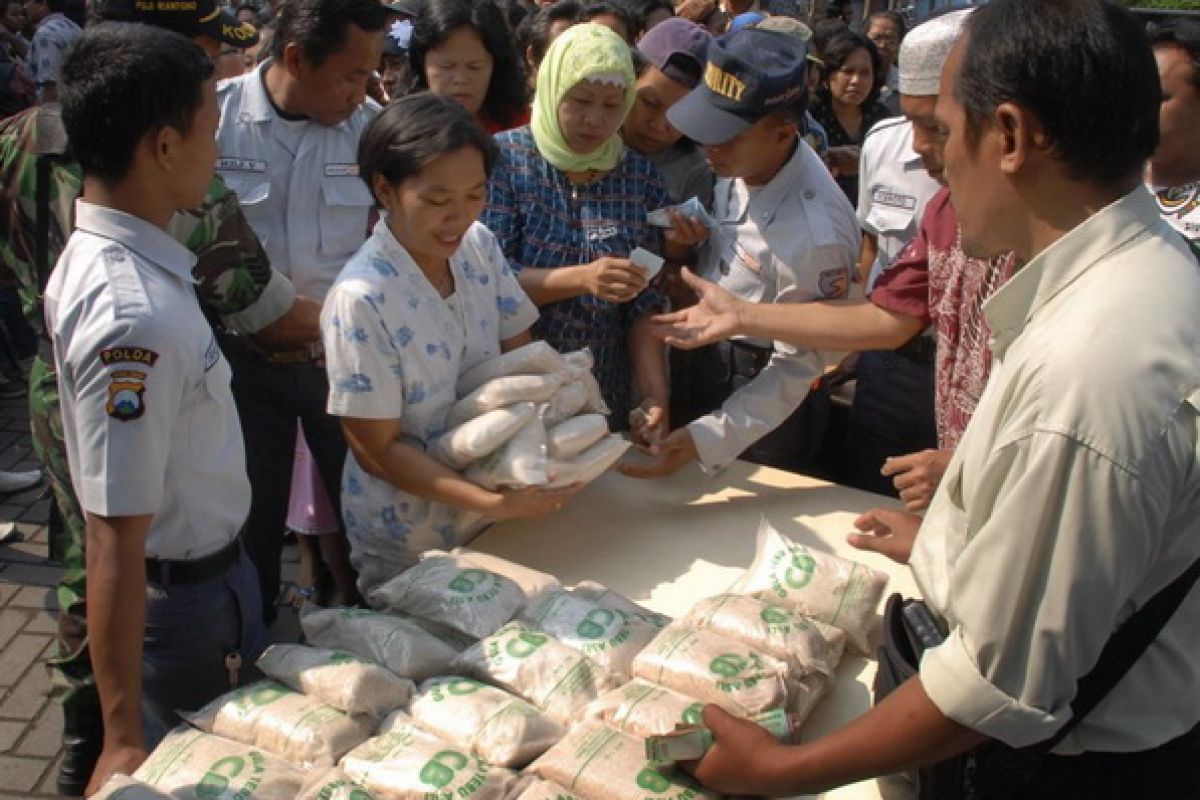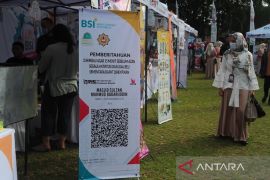Although at present the prices of a number of commodities such as cooking oil, chili and sugar are going down, those of other commodities such as rice, chickens and eggs are now increasing.
Like in previous years, the prices of basic necessities always increase during the fasting month and the Lebaran festivities. Thus, prices will invariably increase, particularly a week before the Idul Fitri festivities.
In order to normalize prices, guarantee the availability of supplies and provide cheap commodities for low-income people during the fasting month and the post-fasting Idul Fitri or Lebaran, the government will conduct market operations, organize bazaars and double food supplies.
The trade minister said that the National Logistics Agency Bulog should also increase its role in suppressing basic necessity price increases. "But Bulog is expected to launch market operations at retail markets while the trade ministry at wholesale markets," she added.
In anticipation of lack of stocks or supplies, the government will double its staples supplies.
Deputy Agriculture Minister Bayu Krisnamurthi said that the government had prepared higher stocks (from 1.5 to 2.5 times higher then the normal one) of food and beverages each time the fasting month arrived.
He said that the government faced no problems with the availability of basic food such as meat, sugar, cooking oil, rice and wheat and it was expected that they would be enough until the end of Ramadhan.
The government will also organize bazaars in various parts of the country to give a chance to low-income people to enjoy various basic necessities with relatively low prices during the fasting month.
"Bazaars are expected to reduce the burden of low-income people," Minister Mari said on Tuesday. The bazaars would be organized together with the central and regional governments in various regions.
"We even have a proposal from an East Java region to set up a kind of `Ramadhan village` where low-priced basic necessities are to be sold there until the end of the fasting month," she said.
The minister said that the demand for various basic necessities usually increased by about 20 percent in the run-up to the post-fasting Idul Fitri festivities or Lebaran. At present however, the minister said, some prices on the national scale are now on the rise but some others are going down.
"Price increases have happened with rice, chicken meat and eggs while prices going down occurred with cooking oil, chili and sugar," she added.
Mari said that the price of meat (beaf) usually increased several days before the Idul Fitri festivities. "Usually, price hikes take place three days before the D-Day but after the peak day, it goes down again," the trade minister said.
Yet there is no problem with meat stocks. The stocks are enough for three months ahead.
Executive Director of the Indonesian Meat Importers Association (Aspidi), Thomas Sembiring said his association had prepared 150,000 cows to ensure meat stocks for three months.
Agriculture Minister Suswono has earlier guaranteed that the government would increase its meat stocks by about 7,000 tons.
In order to monitor the developments of prices and commodity stocks, the government is setting up a 24-hour command post to monitor the developments.
"It could happen that stocks run short due to a weather or distribution factor. We hope the media will report it to us if there are sharp price hikes. We have prepared a 24-hour command post to monitor these conditions and to coordinate with the regions," Mari Elka Pangestu said.
The minister explained that when her side conducted a market operation recently she was informed that traders had also increased their stocks to anticipate rising demand in the face the fasting month.
"We also held coordination, observation and field checks in the Cipinang Rice Wholesale Market last week," she said.
Rice price at East Jakarta`s Cipinang Rice Wholesale Market (PIBC) has begun to increase.
Head of the Trade and Food Data Section of the PIBC, Suminta, said that the rice price had begun to increase because the fasting month would already begin early next month while farmers` rice harvest season was now about to end. The fasting month will start early next August.
After all, a number of regions such as Karawang had also faced difficulties to obtain rice, yet the problem still could be overcome by procuring unhulled rice from Lampung in Sumatra, she said. "Rice price has been increasing gradually since last week by 100 per kg to Rp200 per kg," she said.
Based on the PIBC data on July 19, 2011, the price of Muncul I rice was Rp7,750 per kg, Muncul II Rp7.200 per kg, Muncul III Rp6.700 per kg, IR-64 I Rp7.500 per kg, IR- 64 II Rp7.000 per kg, IR-64 III Rp6.400 per kg and IR-42 Rp7.200 per kg.
(T.A014/HAJM/H-YH)
Reporter: by Andi Abdussalam
Editor: Priyambodo RH
Copyright © ANTARA 2011












